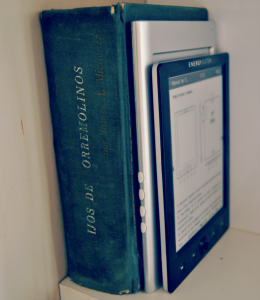The Extinction of Books [Table]

In last week’s article I wrote about how books evolved over time, from inscriptions on clay tablets to the electronic and printed books we know today. What this time line had shown very clearly was that certain variants of the book vanished (almost) completely today.
What does that mean for the printed books we came to love so much? Are they about to get extinct as well? Killed by the e-book like The Buggles sang about video killing the radio star back in the late 70’s?
Online-Spellcheck.com has gathered some thoughts, facts and numbers that will show you that the extinction of the printed book is nowhere near!
Is The Book In Danger Of Extinction?
We say: No!
And to back up our words, lets have a look at some hard to beat numbers first.
Book Price and Sales Comparison
The Launch of of the first Amazon Kindle in 2007 had caused an uproar among bibliophiles. Many saw the end of the printed book in the immediate future with the release of books in an electronic form. Sure, e-books have quite some advantages over the “ordinary” printed book, yet the trend over the past years since the Kindle saw the light of the day paints a more optimistic picture.
A research about the behavior of the book and e-book market in 2013 conducted by PwC showed that:
- while the average price for e-books decreased between 2009 and 2013,
- the percentage of e-book sales compared to all book sales in 2013 is still fairly low, namely 23% in the US.
cf. graphs at Forbes
What about book sales this year? Maybe this example from the UK can answer this question best:
According to an article from The Telegraph, book sales have gone up 5% in December 2015 for physical books—at the Amazon Kindle’s expense!
E-Book vs. Printed Book
The question of what’s better, the e-book or printed book, comes down to personal preferences though. Following, you will find two short lists of some major advantages and disadvantages of both, the physical and electronic book.
| E-Books | |
| advantages | disadvantages |
|
|
| Printed Books | |
| advantages | disadvantages |
|
|
Both lists show that there is almost an equal number of advantages and disadvantages of both types. There are still some features of the book that couldn’t be adopted by the e-book and that casual readers and bibliophiles alike cherish and look for in a good read.
No matter what you prefer though, it is safe to say that the extinction of the “real”, printed book is far away! We don’t have to fear that our favorite past-time medium will share the fate of the Dodo.
